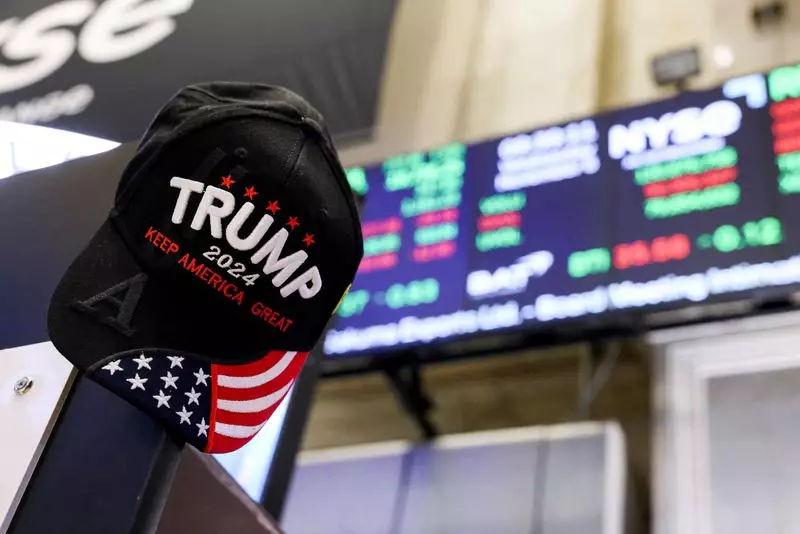Donald Trump’s nomination of Scott Bessent as Treasury Secretary marks a significant moment for investors and economic analysts alike. The role of Treasury Secretary is pivotal, given its influence over economic policy, regulation, and international economic relations. Bessent’s recognition as a prominent investor is welcomed in a context where U.S. government bond markets have been plagued by anxiety and uncertainty. The bond market’s struggles can be attributed to fears surrounding inflation, growing federal budget deficits, and Trump’s proposed economic policies, including tax reforms and tariffs. This article will analyze the broader implications of Bessent’s nomination, highlighting market sentiment and potential future developments.
In the lead-up to Bessent’s nomination, the U.S. bond markets had been experiencing a notable selloff, driven by concerns surrounding an imminent rebound in inflation rates. The benchmark 10-year yield had climbed to a five-month high, as investors adjusted their expectations in light of Trump’s anticipated economic policies. The speculation regarding Bessent’s potential appointment was a contributing factor to the prevailing sense of unease. Economists and investors alike were keenly aware that Trump’s cabinet choices would set the tone for his administration’s economic strategy, making the selection of Bessent a matter of importance.
Reactions from investors indicate a sense of cautious optimism following the announcement. Michael Purves, CEO of Tallbacken Capital Advisors, articulated that many market participants were apprehensive about Trump choosing a nominee who might implement overly aggressive tariffs or lack fiscal prudence. Bessent’s recognition as a fiscal conservative represents a shift towards a more favorable outlook from Wall Street. Joe McCann, of Assymetric, noted that this nomination may pave the way for more responsible fiscal policies which could be essential during a time of fluctuating bond yields.
Investors hope Bessent’s appointment can mitigate fears of extreme tariffs, especially those Trump has floated against China and other nations. Christopher Hodge, economist at Natixis, asserted the potential Bessent holds in conveying market risks to Trump. The prospect of a Treasury Secretary who understands market intricacies bodes well for balancing aggressive trade policies with economic realities.
Bessent’s Economic Philosophy and Potential Influence
Bessent’s previous advocacy for tax reform and deregulation aligns with a free-market philosophy that emphasizes stimulating bank lending and fostering energy production. This approach is particularly relevant for attracting investors, as it signals a shift towards policies that could invigorate economic growth. Understanding Bessent’s perspectives on fiscal discipline and market regulation will be crucial for forecasting the administration’s subsequent impacts on the economy.
Ed Al-Hussainy, senior interest rate strategist at Columbia Threadneedle, noted that any Treasury Secretary would face high scrutiny regarding their stance on crucial issues, including the management of government debt and strategies in response to potential recessions. The consensus among investors is that such insights must manifest from a market-focused viewpoint, especially amidst growing concerns surrounding global financial stability.
Bessent’s nomination raises important questions regarding the future relationship between the Treasury and the Federal Reserve, particularly as Trump has expressed interest in influencing Fed decisions. Such remarks have generated unease among market participants who value the central bank’s independence as fundamental to maintaining market stability. Campe Goodman, a portfolio manager at Wellington Management Company, articulated the hope that the Fed retains its autonomy, as a stable Fed is integral to bond market confidence.
The intricate balance between fiscal policy, regulatory oversight, and central banking independence will shape the economic landscape during Bessent’s tenure. The administration’s future actions will determine whether the anticipated fiscal discipline materializes, or if excessive interventionist measures undermine economic stability.
As Scott Bessent prepares to assume the role of Treasury Secretary, the market is positioned at a critical juncture where leadership choices can have lasting effects on economic outcomes. The expectations surrounding Bessent’s fiscal conservatism provide a glimmer of hope in an otherwise turbulent environment for U.S. government bonds. However, navigating the potential pitfalls of aggressive tariff policies, trade relations, and maintaining the independence of the Federal Reserve will be of paramount importance in shaping a stable economic future. Investors will be watching closely, as the reality of Bessent’s policies unfolds in the context of Trump’s ambitious economic agenda.

